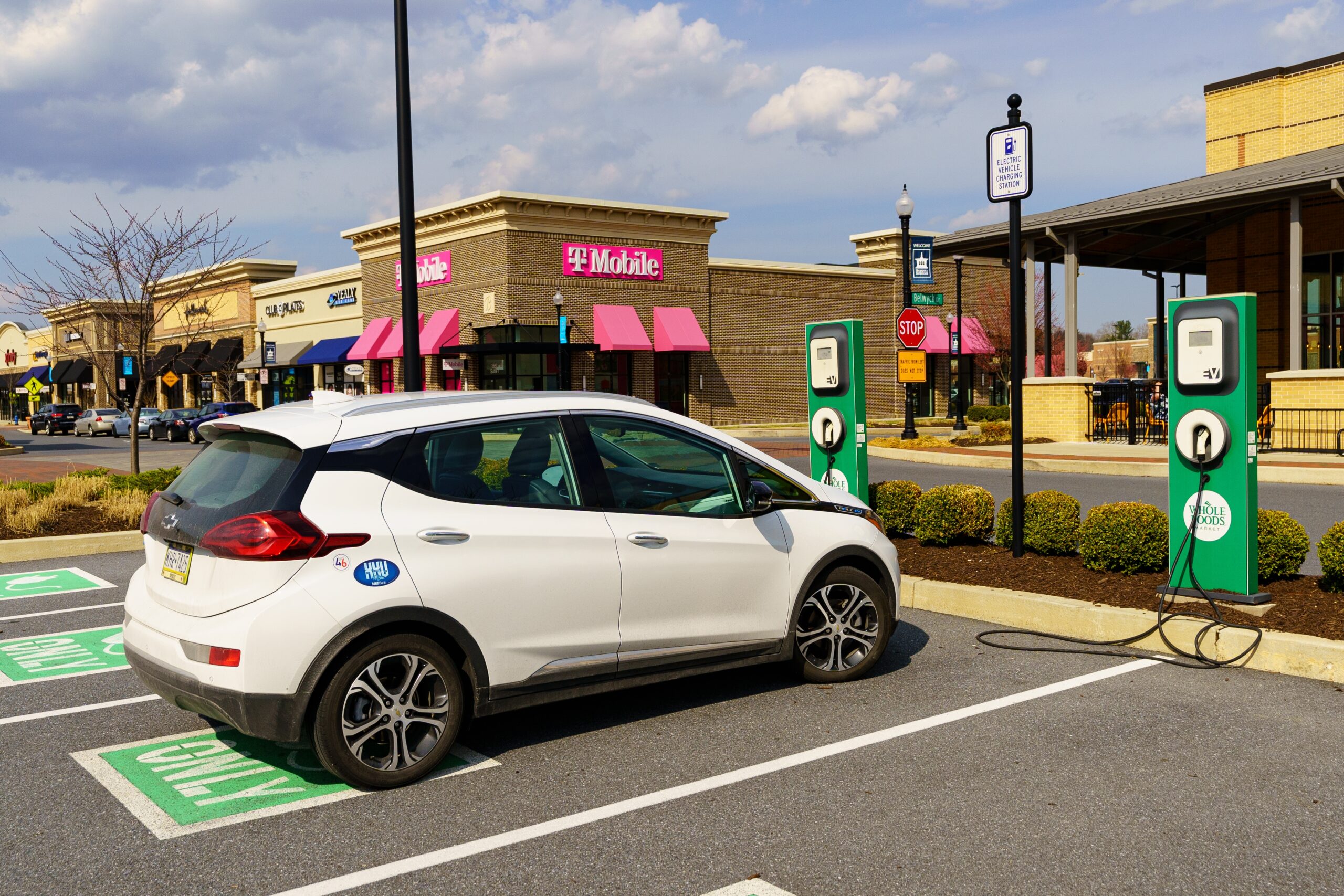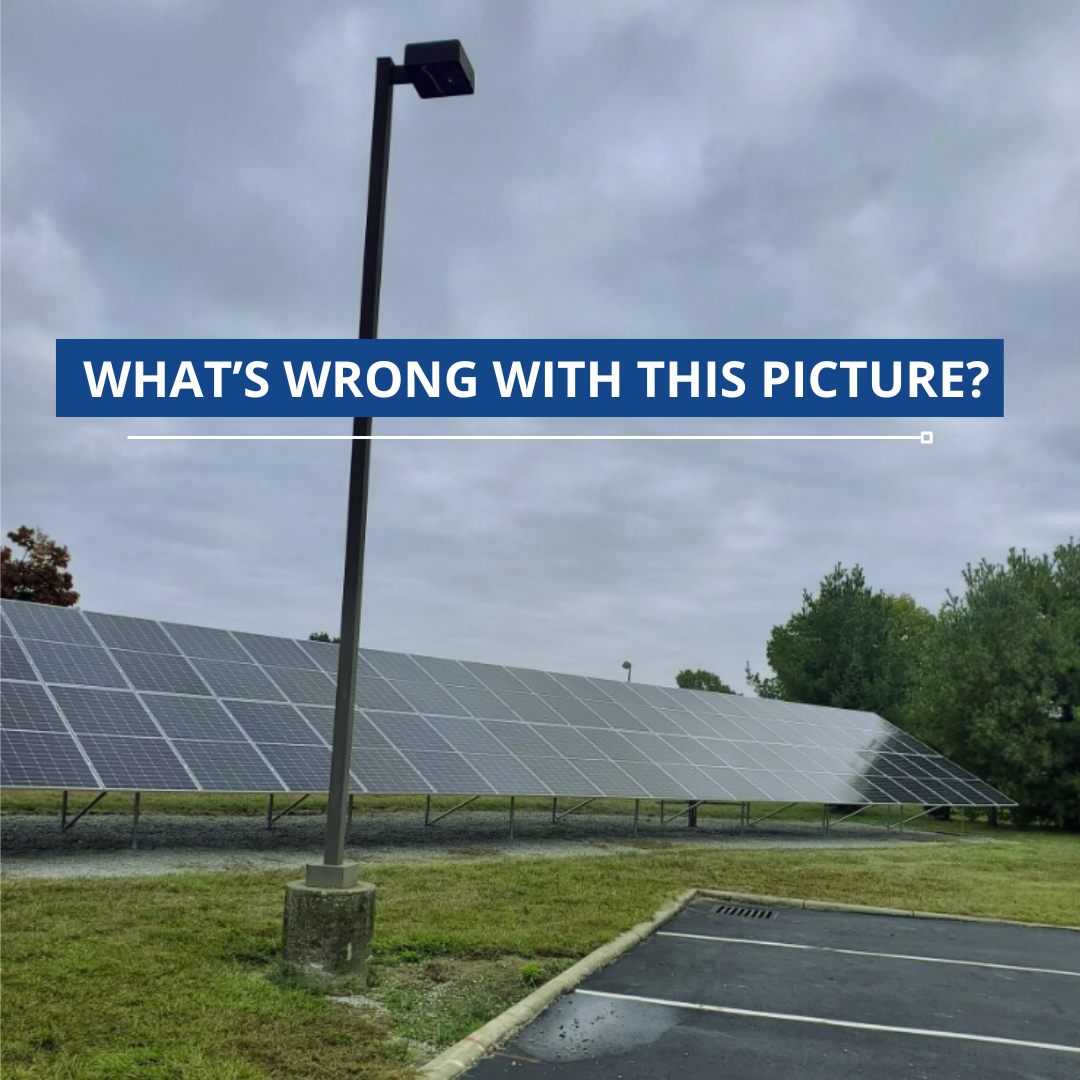The journey toward Commercial Energy Efficiency and more sustainable practices isn’t just a trend; it’s a strategic approach toward a greener future. In the pursuit of Environmental, Social, and Governance (ESG) goals, commercial and industrial companies are increasingly steering their focus toward sustainability initiatives. However, the order in which these projects are undertaken can significantly impact their effectiveness and overall outcomes.
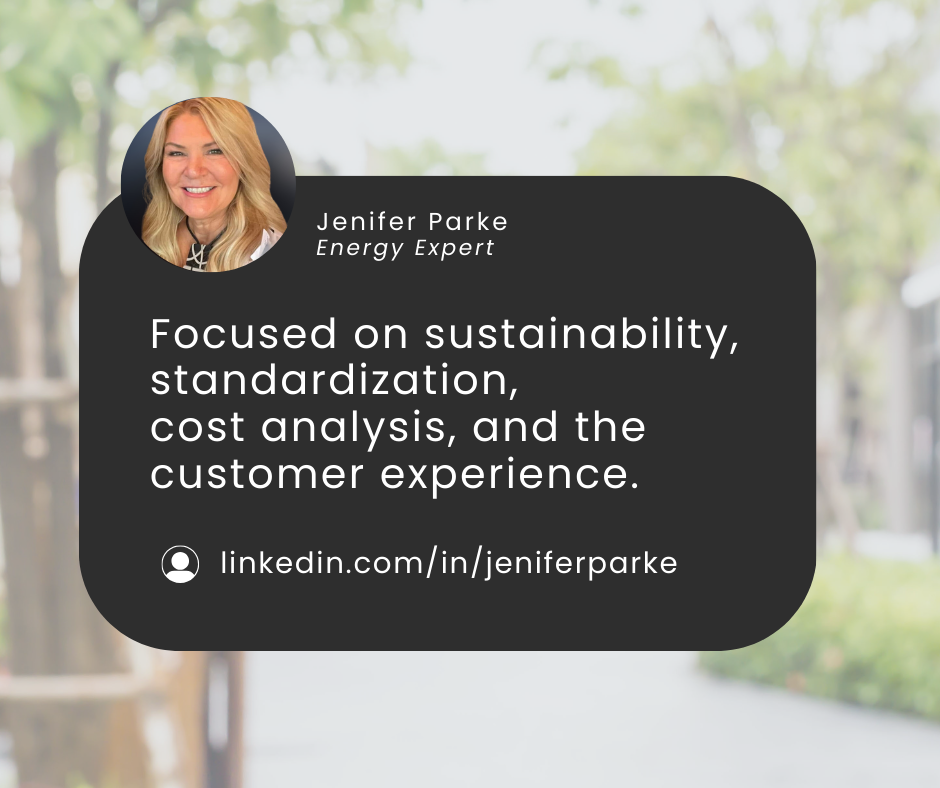
We’ve invited Jenifer Parke, National Key Account Manager at Eco Engineering, with over 20 years of experience helping customers successfully navigate and achieve energy goals, to share her expertise on ESG goals. Jen will outline key points to consider in developing a roadmap to achieve ESG goals as it relates to energy efficiency, energy management, and various energy efficiency measures.
Part 1: Understanding ESG and How it Relates to Energy Efficiency:
Environmental (E): Impact of energy efficiency on carbon footprints and resource depletion.
Energy efficiency strongly aligns with the ‘E’ in ESG, prioritizing practices that directly reduce carbon footprints and minimize resource depletion, positively impacting a company’s environmental scorecard in ESG evaluations.
Social (S): Indirect benefits of energy efficiency on communities & the positive social perceptions for companies prioritizing energy efficiency.
While not directly related to social aspects, energy efficiency indirectly benefits communities by lowering energy consumption, reducing pollution, improving air quality, and potentially lowering energy costs for consumers. Companies focusing on energy efficiency often gain positive social perceptions that support recruiting and retainment efforts.
Governance (G): Role of energy efficiency in responsible resource management & the contribution to operational efficiency within the governance framework.
In governance, energy efficiency contributes to responsible resource management and operational efficiency. Effective energy management demonstrates prudent governance by optimizing resource utilization, reducing operational costs, and promoting long-term sustainability within the company’s governance framework.
Part 2: ESG and How it Relates to Energy Management:
Environmental (E): Alignment of energy management with environmental objectives.
Energy management aligns with environmental objectives by holistically reducing energy consumption and emissions. Robust energy management systems signal a commitment to minimizing environmental impact, highly valued in ESG evaluations.
Social (S): Indirect impacts of energy management on social aspects & the importance of transparent communication in fostering stakeholder trust.
Energy management indirectly impacts social aspects. By reducing energy consumption, companies can allocate savings to social initiatives or community development programs. Transparent communication about energy management fosters stakeholder trust, positively influencing social perceptions.
Governance (G): Integral role of energy management in effective governance & the strengthening of governance credentials through transparent reporting.
Energy management is integral to effective governance, demonstrated through comprehensive energy policies, adherence to regulatory frameworks, and ambitious energy efficiency goals. Transparent reporting on energy management performance strengthens a company’s governance credentials in ESG assessments.
In the context of ESG criteria, both energy efficiency and management are pivotal, showcasing a company’s commitment to sustainability, responsible resource utilization, and efficient operational practices, contributing positively to environmental, social, and governance performance evaluations.
Part 3: Comparing Energy Efficiency Measures vs. Energy Management
Now let’s explore how energy efficiency focuses on improving the efficiency of individual technologies or applications (what I refer to as measures), compared to energy management, which encompasses a broader spectrum, integrating behavioral changes, procurement strategies, and continuous improvement efforts within an organization’s energy-related practices.
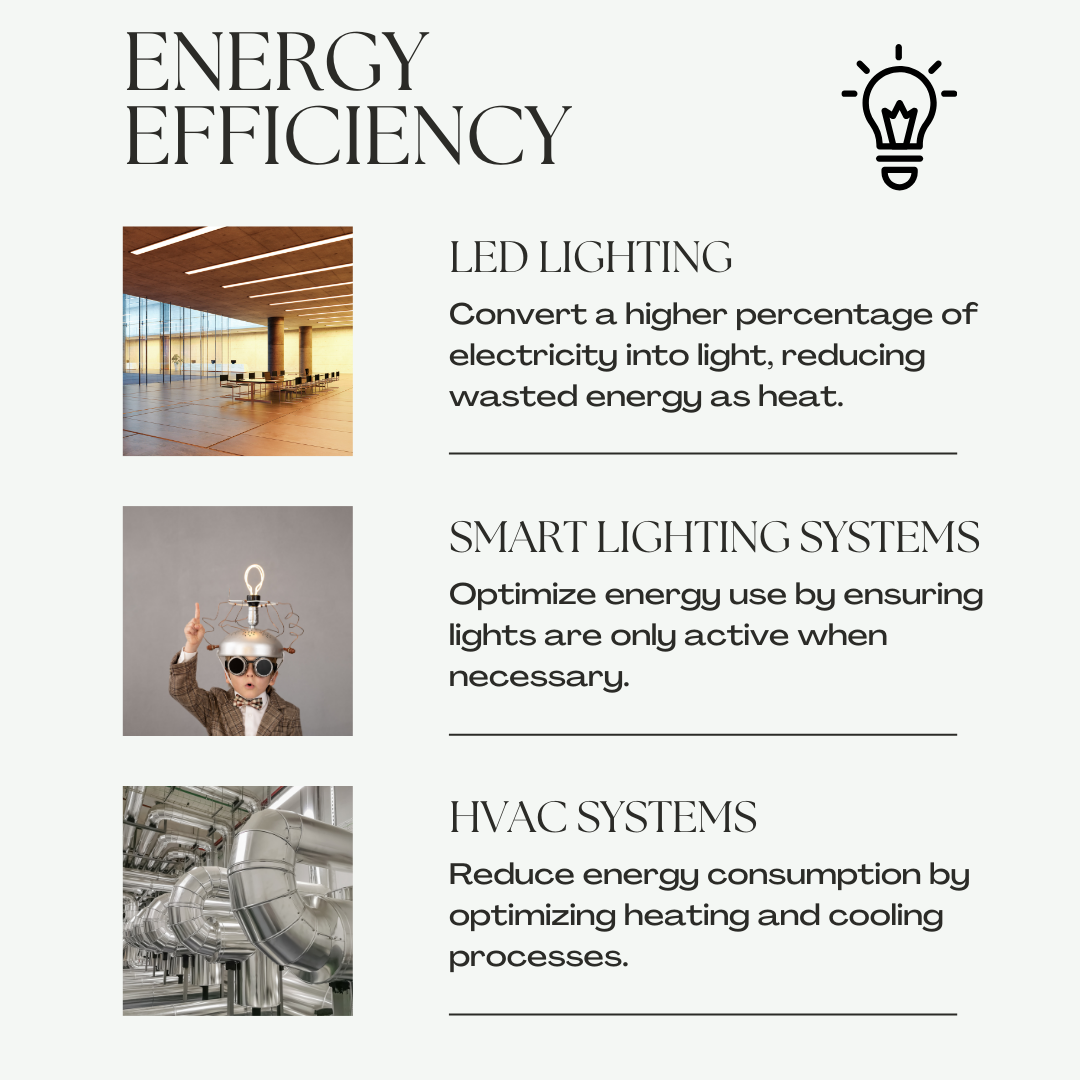
Overview of individual energy efficiency measures
- LED Lighting: LED technology is a prime example of energy efficiency in lighting. LEDs consume significantly less energy than traditional lighting sources while providing the same or better illumination levels. They convert a higher percentage of electricity into light, reducing wasted energy as heat.
- Smart Lighting Systems: Energy management extends to implementing smart lighting systems. These systems utilize sensors and automation to adjust lighting levels based on occupancy or natural light availability. They optimize energy use by ensuring lights are only active when necessary.
Mechanical Examples – Energy Efficiency
- HVAC Systems: Upgrading to energy-efficient HVAC (Heating, Ventilation, and Air Conditioning) systems showcases energy efficiency in mechanical systems. High-efficiency HVAC systems reduce energy consumption by optimizing heating and cooling processes while maintaining comfort levels.
- Efficient Motors and Machinery: Industrial sectors often upgrade to more energy-efficient motors and machinery. Advanced technology reduces energy loss during operations, improving overall efficiency.
Comparing Energy Efficiency vs. Energy Management
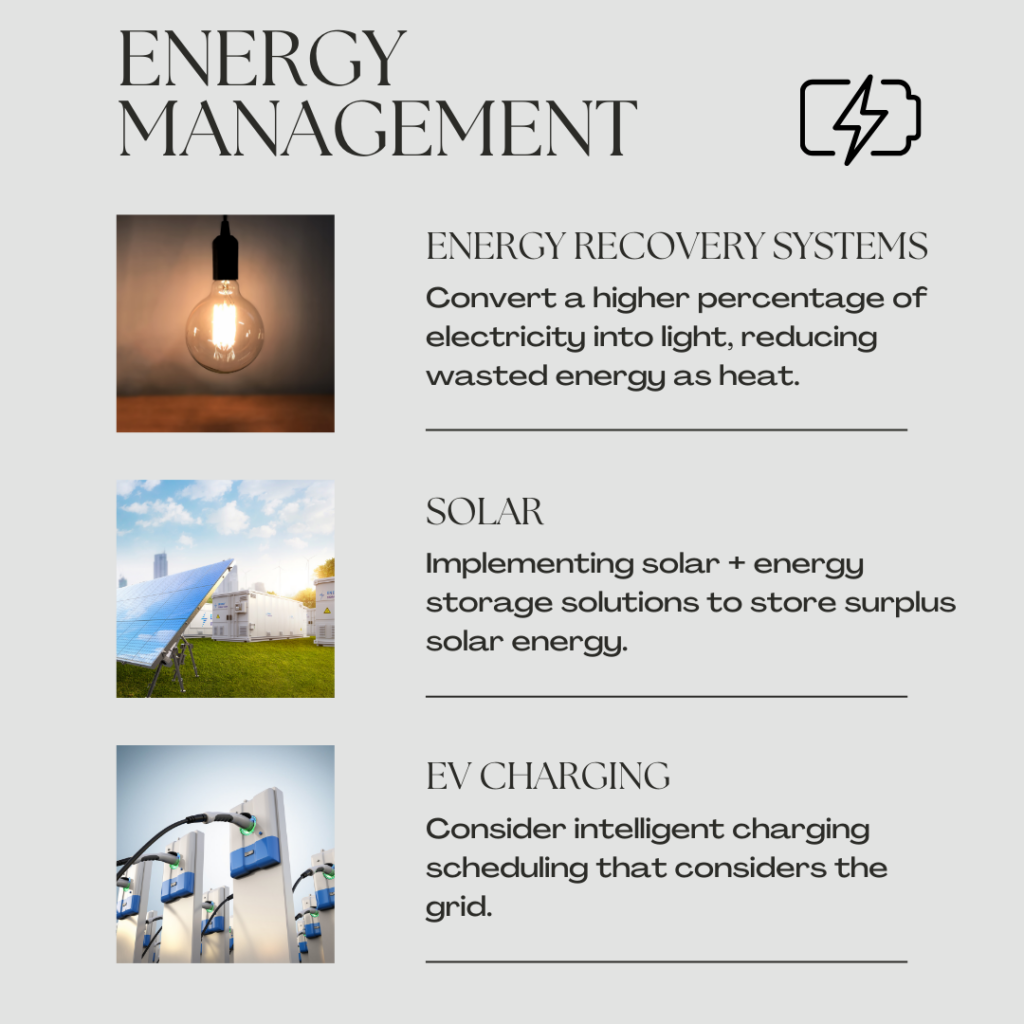
Mechanical Examples – Energy Management
- Maintenance Practices: Energy management involves implementing proactive maintenance schedules for mechanical systems. Regular maintenance ensures optimal performance, reducing energy wastage due to inefficiencies or breakdowns.
- Energy Recovery Systems: Incorporating energy recovery systems within mechanical operations helps capture and reuse waste energy, further optimizing overall energy usage.
Solar Energy – Comparing Energy Efficiency vs. Energy Management
- Energy Efficiency: Installing solar panels exemplifies energy efficiency by directly harnessing renewable energy from the sun. Photovoltaic (PV) systems convert sunlight into electricity with minimal losses, emphasizing the efficiency of generating power from a sustainable source.
- Energy Management: Beyond the installation itself, effective energy management involves optimizing solar power usage. This includes implementing energy storage solutions (like batteries) to store surplus solar energy for use during periods of low sunlight. Additionally, smart grid integration allows for better management and distribution of solar-generated power within a local energy ecosystem.
EV Charging – Comparing Energy Efficiency vs. Energy Management
- Energy Efficiency: EV charging technologies focus on efficiency by improving the energy transfer process. For instance, advancements in fast-charging technologies aim to minimize charging times and maximize the amount of energy transferred to the EV battery per unit of time, optimizing the charging process.
- Energy Management: Energy management in the context of EV charging involves strategies beyond mere charging efficiency. It encompasses intelligent charging scheduling that considers the grid.
Effective energy management not only demonstrates responsible resource management but also fosters long-term sustainability within a company’s governance framework. Energy efficiency, a crucial aspect of energy management, directly enhances governance practices by optimizing resource utilization and reducing operational costs, showcasing prudent governance.
In conclusion, prioritizing energy efficiency and effective energy management is pivotal for companies aiming to meet ESG criteria, and it can have its challenges. However, integration of these practices into corporate strategies signals a firm commitment to sustainability, responsible resource utilization, and efficient operations, ultimately contributing positively to environmental, social, and governance performance evaluations. Emphasizing this commitment is crucial for companies seeking alignment with ESG criteria and enhancing their overall performance.
At Eco Engineering, offers a range of services that can help companies meet ESG criteria by improving energy efficiency and energy management. Their team of nationwide experts can design, engineer, and manage turnkey projects from concept to construction. They provide innovative solutions tailored to match specific energy goals, ensuring projects are completed on time and within budget. With their expertise in sustainable energy systems and resiliency, Eco Engineering can assist with large-scale solar installations, behind-the-meter solar solutions, electric vehicle charging station installation, and more. For over 30 years, Eco Engineering has been completing energy-saving LED lighting retrofits and lighting control projects for commercial & industrial customers and ESCO partners. Learn more about our services and how we can provide guidance to achieve commercial energy efficiency with our proven and consistent processes for centralized project management or contact us now.
About Jenifer Parke. Based in New York, Jen has over 20 years of experience as a leader in the energy & services industry and is recognized for driving energy reduction focusing on sustainability, standardization, cost analysis, and the customer experience. At Eco Engineering, Ms. Parke is specifically responsible for identifying and deploying performance-based contracts, Energy Efficiency as a Service, single & multi-site program management, Electric Vehicle (EV) charging, and Renewable Energy Generation platforms across North America. Read more of her expert blog articles here.







